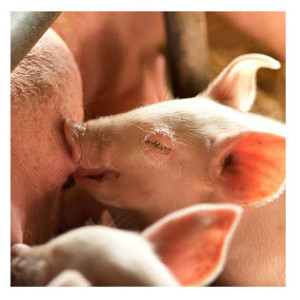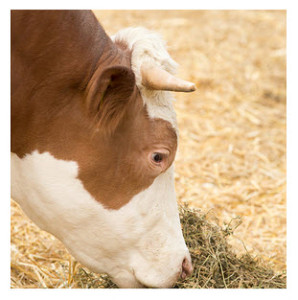You can’t be an environmentalist and eat animal products. Period! Kid yourself if you want. If you want to feed your addiction, so be it. But, don’t call yourself an environmentalist.
— Howard F. Lyman
 Those are damning statements, and potentially inflammatory for people who routinely enjoy beef, poultry, fish, and dairy in their diets, yet consider themselves to be respectful of conserving natural resources — recycling, ride-sharing, not wasting water.
Those are damning statements, and potentially inflammatory for people who routinely enjoy beef, poultry, fish, and dairy in their diets, yet consider themselves to be respectful of conserving natural resources — recycling, ride-sharing, not wasting water.
What do you think of that quote that strikes at the heart of our preference for eating meat? Can animal agriculture really be such an egregious environmental enemy? What if even the mainstream press began to present proof to back up statements like these?
What if you saw a film that illustrated our path toward climate calamity, claiming it is largely a result of our lust for animal agriculture?
Controversy has followed the 2014 documentary, “Cowspiracy,” written and directed by Kip Andersen and Keegan Kuhn, and executive produced by Leonardo DiCaprio. This is a remarkable film that lays its case before the public, highlighting the massive environmental destruction resulting from animal agriculture.
Animal-Based Agriculture. Say What?
The statements above?
Cue Howard F. Lyman, fourth-generation former Montana cattle rancher, author of the 1998 book “Mad Cowboy: Plain Truth from the Cattle Rancher Who Won’t Eat Meat,” speaking in “Cowspiracy.” Unlike many documentaries we may see, this riveting, exceptional film will grab you by the throat and not let go. It is a film that changes lives, explaining this staggering fact:
Animal-based agriculture is the number one cause of climate change in the world today.
What else will you learn?
Animal agriculture includes beef, lamb, chicken, other poultry, pork, eggs, fish and shellfish — resulting in the single greatest:
- Source of greenhouse gas
- Cause of environmental destruction
Sizing the challenge?
 Estimates of the number of farmed animals (not counting fish) raised annually on a global basis vary. I’ve seen everything from 56 billion farmed animals raised for human consumption annually to over 100 billion. Let’s take a figure somewhere in the middle, say 70 billion, and think about it. Our global population (2015) is approximately 7.3 billion. That’s roughly 10 farm animals per person per year — so we can eat — and that figure, of course, is growing as the population is growing.*
Estimates of the number of farmed animals (not counting fish) raised annually on a global basis vary. I’ve seen everything from 56 billion farmed animals raised for human consumption annually to over 100 billion. Let’s take a figure somewhere in the middle, say 70 billion, and think about it. Our global population (2015) is approximately 7.3 billion. That’s roughly 10 farm animals per person per year — so we can eat — and that figure, of course, is growing as the population is growing.*
Do we really think this is sustainable?
Imagine the amount of land, food, and water needed to maintain livestock alone — billions of them — and the natural ecosystems destroyed and re-purposed in order to feed and raise them, in order to feed us, not to mention the ethical and health issues involved in factory farming, also known as industrial farming. Then there are the environmental costs of transporting these animals to our markets and subsequently to our tables.
Denial? Perhaps the Most Damaging Thing of All
We know Big Food is powerful. We know factory farming is cruel. We know that “local” farming offers advantages over factory farming, but some 99% of farm animals in the U.S. are raised on factory farms.
And… We still have a cow problem, a consumption problem, and an ignorance problem.
Until my Cowspiracy experience, I didn’t grasp the scope of animal agriculture, much less its pervasive environmental damage.
Since seeing the film, I have shifted my diet closer toward the vegan side of the spectrum. While not ignoring animal rights issues, my focus has been primarily on environment, particularly with so much to learn in light of my ignorance to date. This is about personal responsibility for my little corner of the Earth, and understanding that we can’t put our heads in the sand. Denial doesn’t serve us. And the stakes couldn’t be higher.
Even as we celebrate Earth Day, including this U.N. climate change pact signed today, we must face scientific realities and the consequences of our collective actions. That includes our meat-eating “addiction” as Howard Lyman calls it.
More Data? You Bet.
More data?
Consider this from EcoWatch:
According to a staggering report published by the Worldwatch Institute, more than half of global greenhouse-gas emissions are caused by animal agriculture…
Beef produces a total of 30kg of greenhouse gas (GHG) per kg of food, while carrots, potatoes and rice produce 0.42, 0.45 and 1.3 kg GHG per kg of food, respectively. No wonder the United Nations said a global shift toward eating less meat is necessary to prevent the worst effects of climate change.
Keeping an animal alive is also resource intensive. Approximately 1,850 gallons of water are needed to produce a single pound of beef. Conversely, only 39 gallons are required to produce a pound of vegetables.
 Did you process those comparisons? Are you as floored as I am?
Did you process those comparisons? Are you as floored as I am?
Of course these are complex and disruptive economic issues. Yet positive change demands that we be adult, and willing to hear new information, to evaluate the legitimacy of its sources, to look at all the angles (and agendas inherent in each), to separate political posturing for profit from hard scientific data, to continue gathering information as we form and refine our understanding, and to take personal responsibility for our part in the systems within which we operate, the choices we make, and the behaviors we undertake to maintain or shift.
And altering habits is easier than we think, just as the influence of one person, then another, then another — and social media sharing — can be brilliantly effective at opening minds and effecting change.
Animal Agriculture and Climate Change
Is mainstream media increasingly on board? You decide for yourself. Included in its November 2015 interactive feature on climate change, The New York Times addresses the importance of reducing our meat consumption:
Agriculture of all types produces greenhouse gases that warm the planet, but meat production is especially harmful – and beef is the most environmentally damaging form of meat. Some methods of cattle production demand a lot of land, contributing to destruction of forests; the trees are typically burned, releasing carbon dioxide into the atmosphere. Other methods require huge amounts of water and fertilizer to grow food for the cows.
The cows themselves produce emissions of methane, a potent greenhouse gas that causes short-term warming. Meat consumption is rising worldwide as the population grows…
This is worrisome: Studies have found that if the whole world were to start eating beef at the rate Americans eat it, produced by the methods typically used in the United States, that alone might erase any chance of staying below an internationally agreed-upon limit on global warming…
Methane’s role in climate change?
From Cowspiracy: Methane has a global warming potential 86 times that of CO2 on a 20 year time frame. 20 years. That’s in our lifetime.
The New York Times goes on to propose the following, relative to their feature:
Share this with 50 friends.
Hey! I Eat Grass-Fed. That’s Good, Right?
So what about eating grass-fed beef? I made that switch a few years ago, willingly picked up the slight extra cost, and was convinced I was doing something better for my health and kinder for the animals I ultimately consume. I blithely assumed this was better for the planet.
Wrong.
Wrong, concerning the environment at least, and the reason is this, citing an audio on WXXI News that you can listen to here. The issue is the amount of land required to raise grass-fed cattle, as Keegan Kuhn, one of Cowspiracy’s filmmakers explains:
A grain-fed cow takes one to 2 acres to reach slaughter weight… If it’s grass, you’re talking 10, and if it’s out west, you’re talking 50 acres.
In other words, we’re expanding the destruction of natural ecosystems and deforestation of the sort that The Times references.
 Kuhn also explains how cows naturally produce methane gas, which is far more damaging to the environment than CO2, the culprit we’ve been taught is the Number 1 Greenhouse Gas Bad Guy.
Kuhn also explains how cows naturally produce methane gas, which is far more damaging to the environment than CO2, the culprit we’ve been taught is the Number 1 Greenhouse Gas Bad Guy.
Cowspiracy does an excellent job of illustrating these issues, and also situates them in a historical, economic, and to a degree, geopolitical context.
Among the facts highlighted on the Cowspiracy site:
Livestock is responsible for 65% of all human-related emissions of nitrous oxide – a greenhouse gas with 296 times the global warming potential of carbon dioxide, and which stays in the atmosphere for 150 years.
Now What?
It’s Earth Day. What better moment to call attention to the many ways we can incorporate behavioral changes into our lives — changes that may not be as difficult as we think — as we hold our planet’s future in our hands?
Read the linked references. Listen to the audio. See the film. Pay particular attention to Howard Lyman.
I believe that you, like me, care deeply about how you live, the beauty of the natural world we so enjoy, and the importance of bequeathing that world intact to your children, and their children after them.
 I know myself to be an idealist, a realist, and a skeptic. These are not mutually exclusive traits; on the contrary. Yet idealism encourages me and those I respect most to reach for our personal best, to believe in your personal best, and the ability to do the right thing for yourselves, your families, your neighbors, your communities, and yes, that means doing a better job for Mother Nature.
I know myself to be an idealist, a realist, and a skeptic. These are not mutually exclusive traits; on the contrary. Yet idealism encourages me and those I respect most to reach for our personal best, to believe in your personal best, and the ability to do the right thing for yourselves, your families, your neighbors, your communities, and yes, that means doing a better job for Mother Nature.
Educate yourself. It isn’t hard.
Tweak a few habits. That isn’t hard either.
Remember these 12 changeable habits to help the environment; they’re things we can do daily.
Just as The Times has asked, I ask that you share this post or The Earth Week Series in its entirety. Watch Cowspiracy. Then watch this Youtube video of Howard Lyman speaking plainly on these issues.
Read. Listen. Learn. Question. Act.
Please.
*Also recommended: This short video on world population growth.
Read more in The Earth Week Series here.
You May Also Enjoy

Okay this series of articles made me think about my health and the environment. Please stop. I am kidding. Now that I have lived longer than I thought (40) I need to think about health. Environmentally we all need to work together. Before I start I need to determine the carbon footprint of red wine and Grand Marnier. I love red meat so this is difficult.
It is indeed difficult, Curtis.
Watch Cowspiracy. It will be less difficult.
I’m glad you’ve gotten something out of the Earth Week articles. I hoped they might be not only interesting, but eye-opening.
Cowspiracy is a good film, it affected me in a similar way to reduce my meat consumption. There is a lot of conflicting information but on the whole, it seems fairly clear to move to a more plant based diet, drastically reduce sugar, and reduce processed carbohydrates. Gut/intestinal biome health seems to benefit from more fibre and less sugar also so there seems to be little downside. When I started, I experienced dizziness and flu-like symptoms but after a few days, my health has steadily improved. The main benefit is no more sugar/carb crashes where you feel you have to eat; just breakfast (sugar-free muesli + milk), coffee+splash of milk, lunch and then vegetarian dinner; no snacks except a few almonds in the afternoon, nothing in the evening. I don’t feel hungry at all and in social situations, smaller portions works out fine, The key for me is to eat mostly vegetarian when I can control what I eat; moving towards less meat consumption overall. I don’t know what the answer is with respect to eliminating meat and animal products entirely but moving in that direction seems like the right thing to do for many reasons.
Interesting to read this post and thank you for it. I think the information that you’ve presented here needs to be seen and heard everywhere and unfortunately, it’s hardly being mentioned. I was actually surprised that you could find an article in the NY Times!
I became a vegan ten years ago and while I made the change for the sake of the animals, I soon began to learn about and understand the environmental impacts. Having two little grandkids and understanding the kind of world we are going to leave them, I am absolutely horrified to discover that by and large, people don’t care.
I’ve presented some of the same facts on another forum that I used to go to and out of all the loving ‘grandparents’ there who bothered to take part in the conversation, not a one said they were thinking about changing anything about the way they eat in spite of the evidence shared. Their attitude was ‘born eating meat, will die eating meat’. No change, not even for their grandchildren or their grandchildren’s children.
On the whole, the ‘me’ generation is alive and well. As it stands, I think we are living in the time of the earths last gasp and the only hope is that enough young people with their more flexible minds and unhardened hearts will see what is coming. And maybe, their numbers will offset the harm that we’re doing and hold off catastrophe until there are enough of them to make the required changes in how we all live.
Anyway, good job presenting the facts! Excellent post.